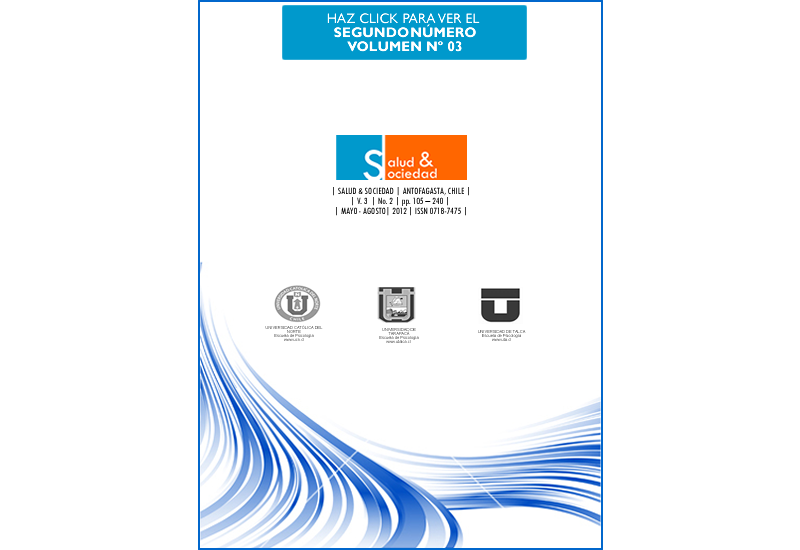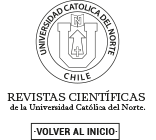Niveles de autoconcepto, autoeficacia académica y bienestar psicológico en estudiantes universitarios de la ciudad de Temuco.
DOI:
https://doi.org/10.22199/S07187475.2012.0002.00002Palabras clave:
Autoconcepto, Autoeficacia académica, Bienestar subjetivo, Self-concept, Academic Self-Efficacy, Psychological Well-Being,Resumen
El objetivo del estudio fue conocer el nivel de autoconcepto, autoeficacia académica y bienestar psicológico de universitarios chilenos. Se revisan baremos de tres escalas en 691 sujetos. Los hombres presentan mayor nivel de Autoconcepto Emocional y Físico. A mayor edad mejoran los niveles de Autoconcepto Académico, Emocional, Familiar y Físico.
En área disciplinar los estudiantes de salud presentan mejor Autoconcepto Académico, los de educación presentan mejor Autoconcepto Social y los del área psicosocial mayor nivel Emocional y Familiar. En Autoeficacia Académica no existe diferencia entre hombres y mujeres. En Bienestar Psicológico los hombres presentan mayor autonomía y las mujeres mayor dominio del entorno. Los estudiantes de Salud presentan los mejores niveles en las dimensiones evaluadas.
The objective of this study was to study the level of self-concept, academic self-efficacy and psychological well-being of Chilean university students. We reviewed measures of three scales among 691 subjects. Men were found to have higher levels of emotional and physical self-concept. The older ones had higher standards of academic, emotional, familial and physical self-concept.
Students in health sciences had better academic self-concept; those in the field of education enjoyed better social selfconcept, and those from psychology demonstrated the highest emotional and family levels. In academic self-efficacy there was no difference between men and women. In psychological well-being, men had greater autonomy and women had greater control of the environment. Students of health sciences area had the highest levels of the evaluated dimensions.
Citas
Bandura, A. (1982). The assessment and predictive generality of self-percepts of efficacy. Journal of Behavior Therapy and Experimental Psychiatry, 13, 195-199.
Bandura, A. (1989). Social cognitive theory. In R. Vasta (Ed.), Annals of child development. Vol. 6. Six theories of child development (pp. 1-60). Greenwich, CT: JAI Press.
Bandura, A. (1997). Self-Efficacy: The exercise of control. New York: W. H. Freeman.
Batista-Foguet, J., Coenders, G., Alonso, J. (2004). Análisis factorial confirmatorio: Su utilidad en la validación de cuestionarios relacionados con la salud. Revista de Medicina Clínica, 122, 1, 21-27.
Bilbao, M. (2008). Creencias Sociales y Bienestar: Valores, creencias básicas, impacto de los hechos vitales y crecimiento psicológico. Tesis Doctoral, Departamento de Psicología Social y Metodología de las Ciencias del Comportamiento. Universidad Del País Vasco - Euskal Herriko Unibertsitatea.
Bronfenbrenner, U. (1977). Toward an experimental ecology of human development. American Psychologist, 32, 513-530.
Burns, R. (1990). El autoconcepto. Teoría, medición, desarrollo y comportamiento. Bilbao: Ediciones Egea.
Busso, E. (2003). Aspectos de la habilidad motriz en la educación física escolar (Aspects of motor abilities in the school physical education). Unpublished doctoral dissertation, University of Valencia, Spain.
Byrne, B. (1984). The general/academic self concept nomological network: A review of construct validation research. Review of Educational Research, 54, 427-456.
Cardenal, V. y Fierro, A. (2003). Componentes y correlatos del autoconcepto en la escala de PiersHarris. Estudios de Psicología, 24, 101-111.
Cheung, G. W., & Rensvold, R. B. (2002). Evaluating goodness-of-fit indexes for testing measurement invariance. Structural Equation Modeling, 9, 233–255.
Díaz, D., Rodríguez, R., Blanco, A., Moreno, B., Gallardo, I., Valle, C. y van Dierendonck, D. (2006). Adaptación española de las Escalas de Bienestar Psicológico de Ryff. Psicothema, 18, 3, 572 – 577.
Donoso, S. (2003). Exito y fracaso de los participantes en las etapas del proceso de selección a las universidades del Consejo de Rectores. Variables Asociadas. Santiago, Chile: Universidad Academia de Humanismo Cristiano.
Duckworth, A., Steen, T. A. y Seligman, M. (2005). Positive psychology in clinical practice. Annual Review of Clinical Psychology, 1, 629-651.
Fox, K. y Corbin, C. (1989). The Physical Self-Perception Profile: development and preliminary validation. Journal of Sports and Exercise Psychology, 11, 408-430.
Garaigordobil, M, Durá, A. (2006). Relaciones del autoconcepto y la autoestima con la sociabilidad, estabilidad emocional y responsabilidad en adolescentes de 14 a 17 años. Revista. Análisis y Modificación de Conducta, 32, 37-64.
García, F., Musitu, G. (1999). Autoconcepto Forma 5, AF5. Publicaciones de Psicología Aplicada. Madrid: TEA Ediciones, S.A.
García, F., Musitu, G., Veiga, F. (2006). Autoconcepto en adultos de España y Portugal. Psicothema, 18, 3, 551- 556.
Harter, S. (1985). Manual for the SelfPerception Profile for Children. Denver: University of Denver.
Harter, S. (1987). The determinants and mediational role of global self-worth in children. En N. Eisenberg (Ed.), Contemporary issues in developmental psychology (pp. 219-242). New York: Wiley.
Harter, S. (1988). Manual for the SelfPerception Profile for Adolescents. Denver: University of Denver.
Harter, S. (1989). Causes, correlates and the functional role of global self-worth: a life span perspective. En J. Kolligan y R. Stenberg (Eds.), Perceptios of competence and incompetence across the life spam (pp. 43-70). New York: Springer-Verlag.
Hu, L. y Bentler, P.M. (1999). Cutoff criteria for fit indexes in covariance structure analysis. Conventional criteria versus new alternatives. Structural Equation Modeling, 6, 1-55.
Keyes, C., Ryff, C., y Shmotkin, D. (2002). Optimizing well-being: The empirical encounter of two traditions. Journal of Personality and SocialPsychology, 82, 1007-1022.
Klomsten, A. T., Skaalrik, E., y Espnes, O. (2004). Physical self-concept and Sports: Do gender differences still exist?. Sex Roles, 50, 119-127.
L´ecuyer, R. (1985) El concepto de sí-mismo. Barcelona. Oikos-Tau. (Original: Le concept de soi. Paris: Universitaires de France). Versión Castellana de Ferrer.
Lima, M. L. y Novo, R. (2006). Nós por cá todos bem? Bem-estar subjetivo e social em Portugal e na Europa. En J. Vala y A. Torres (Eds.). Contextos e Attitudes Sociais na Europa. Lisboa: ICS Instituto de Ciencias Sociais.
Marsh, H. W., y Shavelson, R. J. (1985). Self-concept: its multifaceted, hierarchical structure. Journal of Educational psychologist, 20, 107-123.
Marsh, H. W. (1990). A multidimensional, hierarchical self-concept: Theoretical and empirical justification. Educational Psychology Review,2, 77-172.
Marsh, H. W., Craven, R. G., & Debus, R. (1991). Self-concepts of young children aged 5 to 8: Their measurement and multidimensional structure. Journal of Educational Psychology 83, 377-392.
Marsh, H, y Craven, R. (2002). The Pivotal Role of Frames of Reference in Academic Self-concept Formation: The Big Fish Little Pond Effect Self-Concept Enhancement and Learning Facilitation (SELF). Research Centre, Sydney: University of Western Sydney.
Marsh, H. (2005). Self-concept theory, measurement and research into practice: the role of self-concept in educational psychology. The education section of the british psychological society.
Morales, P. (1988). Medición de Actitudes en Psicología y Educación: construcción de escalas y problemas metodológicos. San Sebastián: Ttarttalo.
Moritz, K., Read, M., Clark, R., Callahan, C. and Albaugh, S. (2009). Grade and Gender Differences in Gifted Students Self-Concepts. Journal for the Education of the Gifted, 32, 3, 340-367.
Moreno, Y. (1997). Propiedades psicométricas del Perfil de Autopercepción Física (PSPP). Valencia: Universidad de Valencia.
Neira, H. (2004). Educación universitaria en Chile: una visión panorámica centrada en los alumnos. Revista de Estudios Pedagógicos, 30, 123-133.
Nunnally, J. C. (1987). Teoría Psicométrica. Mexico: Trillas.
Rodríguez, J. (Coord). (2004). Tasas de éxito y fracaso académico universitario: identificación y análisis de variables psicoeducativas relacionadas en una muestra de estudiantes españoles. Madrid: Universidad Miguel Hernández de Elche.
Ryff, C. D. & Keyes, C.L. (1995). The Structure of Psychological Well-Being revisited, Journal of Personality and Social Psychology, 69, 719-727.
Ryff, C. D. (1989). Happiness is everything: or is it? Explorations on the meaning of psychological well-being. Journal of Personality and Social Psychology, 57, 1069-1081.
Seligman M. E. (2003). La auténtica felicidad. Barcelona: Vergara Ed.
Shavelson, R. J., Hubner, J., y Stanton, J. (1976). Self concept: Validation of construct interpretations. Review of Educational Research, 46, 407-411.
Snyder, C. R. y Lopez, S. J. (Eds.) (2005). Handbook of Positive Psychology (pp. 45-59). Oxford: Oxford University Press.
Sonstroem, R., Speliotis, E., y Fava, J. (1992). Perceived Physical Competence in adults: An examination of the Physical Self-Perception Profile. Journal of Sports and Exercise Psychology, 14, 207-221.
Stein, R. (1996). Physical self-concept. En B.A. Bracken (Ed.), Handbook of selfconcept: Developmental, social and clinical consideratins (pp. 374-394). Oxford: Jhon Wiley and Sons.
Tomás, J. M., & Oliver, A. (2004). Confirmatory factor analysis of a Spanish multidimensional scale of selfconcept. Revista Interamericana de Psicología, 38, 285-293.
Torre, J. (2007). Una triple Alianza para un Aprendizaje Universitario de Calidad. Madrid: Universidad de Comillas.
Van Dierendonck, D. (2004) The construct validity of Ryff’s Scale of Psychological well-being and its extension with spiritual well-being. Personality and Individual Differences, 36, 3, 629-644.
Veenhoven, R. (1999). Quality of life in Individualistic Society: A comparison in 43 Nations in the Early 1990`s. Social Indicators Research, 48, 157-186.
Publicado
Cómo citar
Número
Sección
Los autores continúan como propietarios de sus trabajos, y pueden volver a publicar sus artículos en otro medio sin tener que solicitar autorización, siempre y cuando indiquen que el trabajo fue publicado originariamente en Revista Salud & Sociedad (ISSNe:0718-7475).



_(1).png)





